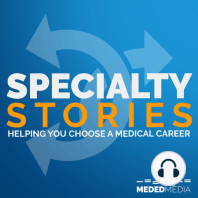38 min listen

26: How to Think About Choosing a Residency & Specialty
26: How to Think About Choosing a Residency & Specialty
ratings:
Length:
24 minutes
Released:
Jun 7, 2017
Format:
Podcast episode
Description
Session 26 There are many things to think about when you are deciding your future career. In this episode, we discuss how you should start that process. The goal of this podcast is to speak to specialists from every field, both community and academic. But I want to rewind a little bit and talk about the whole process of just thinking about these specialties and the questions you should be asking yourself, and what you should be thinking about as you're going on this journey so that as you listen to these interviews, you will have a better sense of what you're thinking about and your goals in career and life in general. [02:10] Keep an Open Mind A large percentage of premeds that go into medical school know what they want to do. But keep in mind that most medical students change their minds. They may get in a specific field after exposure and research but as they get more involved in the field through rotations and doing a lot more clinical work as a medical student, they realize it's not for them. So realize that your preference can change. Don't hold onto your convictions of wanting to be a certain specialty. Let go a little bit of that and keep an open mind as you are going through this process. [03:38] Academic/Community, Urban/Rural Settings Understand that with that, what you see as a medical student is typically urban, academic medicine. For DO students, that's not always the case because most DO schools are not associated with large academic medical centers. You have to go around to different hospitals. Some are academic while others are more community-based or more on the suburbs or more rural, wherever the hospitals are that you rotate at based on the schools you go to. Understand that what you see day in and day out as you're a first year, second, third, or fourth year student doing your rotations and doing your preceptorships and your pre-clinical years, the medicine you're likely seeing is not how the majority of medicine is practiced. So when you're out shadowing a cardiologist in a large urban, academic medical center, the life of that cardiologist could be 180 degrees different than a community-based cardiologist or a rural-based community cardiologist. As you're setting up rotations for your sub-internships and getting more involved in some of these electives (cardiology is not the best because it's a fellowship you do after medicine), try to mix up academic and community settings to give yourself an idea of what you want for yourself. Do you see yourself as an academic person? Do you want to be around residents and medical students? Or do you just want to work as a physician and practice? Do you enjoy teaching? Do you enjoy doing research? Research is usually big in the academic world. You can do plenty of research in the community too but in the academic world, research is more mandatory. Or do you want to have a hybrid setup? We talked to Dr. Topf back in Episode 16. His is more of a community-based nephrologist but is also involved in academics and running a fellowship program for nephrology. So you can have a little bit of the best of both worlds. Start thinking about those settings. Start thinking about where you want to go to residency. Have those ideas in mind regardless of the specialty. [07:00] Introvert or Extrovert Think about what kind of person are you? Are you an introvert or an extrovert? I, myself, am an introvert by nature. When I go out and interact with people and when I used to interact with patients all day before medical school and during medical school, when I was interacting with clients all day while I was a personal trainor, I would be completely drained at the end of the day. Working with people drains me. Even being at conferences drains me. If I would have taken that into account and it was significant enough that at the end of the day, I was completely wrecked and couldn't do anything, maybe I would think about a specialty that is a little bit patient-focused. If that's the type
Released:
Jun 7, 2017
Format:
Podcast episode
Titles in the series (100)
25: An Academic Urologist Shares His Thoughts on the Field: Session 25 Academic Urology is a mix of medicine and surgery. Listen to Dr. Peter Steinberg discuss what drew him to the specialty, whether you and your personality would suit in this field, and what you can do to be a competitive applicant given... by Specialty Stories